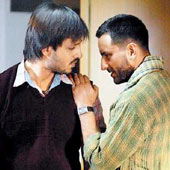Christopher Hitchens has contributed an interesting piece on Clive James’s North Face of Soho to this week’s Times Literary Supplement.
Hitchens is someone with whom I don’t always agree, but there is a good deal to what he has to say in this essay of his. He reminds readers at the very beginning of his piece that James, in North Face of Soho, admits not once, but twice, to Peter De Vries’s ambition of having a “mass audience large enough for his elite audience to despise”
James’s strenuous test of the De Vriesian proposition was to try to demonstrate that one could be simultaneously cerebral and on television……with the implied wager that no diminution of standards would be required
This, it seems to me, gets us the very heart of the problem James was creating for himself at the outset of his career. In the same way as the thought he could be “cerebral and on television” he also thought that he could be cerebral and be in the pop music business. There were many wise heads to warn him – and the young Hitchens was no doubt one of them – of the dangers of this line of thinking. Something would have to give, and they were pretty sure of what that would be, They believed that James should have known better than to think for one moment that he could be as serious with the pop song as he was when he wrote for the TLS or LRB, and they were pretty vociferous about it.
However, there were also a great many people around – people, like myself, who had eagerly devoured almost everything Clive wrote – who believed that being cerebral and producing popular cultural artefacts, such as television programmes and pop songs, need not be separate or mutually exclusive activities. If anybody could bridge the gap that appeared to exist between the cerebral and the popular, the young James could, or so we hoped. The appearance of the first James/Atkin albums,(see Pete Atkin on blogroll) and James’s contributions to TV shows such as So it Goes and New Faces together with the essays he’d written for various music magazines, suggested that he knew enough about pop and popular culture to be able to bring to television and popular song-writing the touches of class they so conspicuously lacked.
Peter Porter, reviewing James’s Other Passports: Poems 1958- 1985 for the London Review of Books in January 1987, wrote:
Literary critics have not taken kindly to the several albums of songs he wrote with Pete Atkin, and I don’t feel able to access them myself. But this indifference has been largely an averting of eyes from what we understand only partly and turning our gaze to the many other departments of art James excels in. One critic, reviewing a James/Atkin album excoriated James for thinking that neat movement quatrains could possibly be appropriate to the kind of music Atkin writes. He might have done better to recognise that James’s craftsmanship is positively evangelical in the field of Pop. Let it be better made, as the lyrics were in the days of Cole Porter, Lorenz Hart and Ira Gershwin, is his belief.
That James was trying to get things “better made” at a time when in Pop, with a few outstanding exceptions, the downright poorly made was getting more airtime and attention than it deserved probably had a lot to do with the fact that the the songwriting project all but withered on the vine.
I think you can hear the penny dropping with James – as it dropped with me – when, on the 9th of October 1977, he included in his Observer TV column a comment about a recent Cliff Richard appearance on television:
A guest on Parkinson (BBC1), Cliff Richard sang a song of his own composition. ‘There is nothing between we two’ he warbled thinly. Us were in luck.Writing, Cliff told his host, was important to him. ‘Why hasn’t that special woman entered your life?’ asked a puzzled Parky. Cliff said, as he has been saying for the past twelve years, that there is no point in getting married for the sake of it. His argument gained force from the consideration that a decade or so of celibacy can do wonders for your creative powers. Vital, ageless and now an important writer, Cliff is a shining example to all of we.
What was the craftsman trying to make it better to do when the popular singer, who by this time had two decades of success in the recording industry behind him and who no doubt should have had some advisers who should know enough to prevent him from making a complete ass of himself , could not even recognise that a line – his own – was not written in proper English? The time for trying to make it better, James must have had to concede to himself, had not come – at least not in England.

